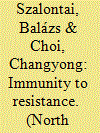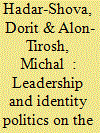| Srl | Item |
| 1 |
ID:
130550


|
|
|
|
|
| Publication |
2014.
|
| Summary/Abstract |
Purpose-This article investigates whether certain social and subnational groups that have shown resistance against other one-party states might play a similar role in North Korea.
Design/methodology/approach-Comparing the DPRK with various Communist regimes and Baathist party-states in Syria and Iraq, this article examines the following social groups as potential factors of resistance: industrial workers, private entrepreneurs, and religious, ethnic and regional identities.
Findings-Resistance has not been wholly absent in North Korean, but the disaffected social groups have lacked sufficient bargaining power, while the state has occasionally refrained from steps that triggered protests in other countries.
Practical implications-By comparing the DPRK with various types of regimes (pre-reform Communist systems, partially market-oriented Communist systems, and Baathist party-states), the article also seeks to investigate whether the dynamics of North Korean society is largely unique, or if it can be at least partially explained by means of analogy.
|
|
|
|
|
|
|
|
|
|
|
|
|
|
|
|
| 2 |
ID:
149190


|
|
|
|
|
| Summary/Abstract |
This article addresses identity politics in Israeli society on the eve of the 2015 elections as recounted in interviews with Israeli children. Children belonging to four groups of Israeli society (secular Jews, religious Jews, Ethiopian Jews and Arabs) were asked about the suitability of male and female candidates running for the position of Israeli prime minister. The findings can be viewed through two types of power relations: gender power relations and power relations between groups of different collective identities. Gender power relations reflect gender inequality. One example of this inequality is that female candidates are perceived as transparent in regard to their suitability for the post of prime minister. Power relations between different groups reflect the hierarchy of collective identities; secular Jews hold a hegemonic status, while other groups weaken each other in order to strengthen their own relative status within the hierarchy. This study shows that power relations between the four groups in Israeli society are present and internalized as early as elementary school a finding that holds important implications as Israel works toward its ultimate goal of democracy.
|
|
|
|
|
|
|
|
|
|
|
|
|
|
|
|
| 3 |
ID:
114637


|
|
|
|
|
| Publication |
2012.
|
| Summary/Abstract |
The use of the mobile phone to contact research subjects granted me privileged access to a body of poetic and humorous texts. This article examines Cape Verdeans' use of pass-forward text messages to express allegiances to different collective identities that provide information and inspiration for Cape Verdeans living in Portugal. They are used to foment and express solidarity between Cape Verdeans, Africans, Christians and Women. An analysis of their contents elucidates two aspects of belonging. Firstly, the personal and intimate which tends to the Self, in its yearnings for a better future and for intimate relationship, sought through religious communion and romance. Secondly, the political and discursive which foments community, imagined not only through nation, Pan-Africanism and gender, but also beyond any such boundaries towards an all-inclusive dimension of belonging, rooted in relations of solidarity.
|
|
|
|
|
|
|
|
|
|
|
|
|
|
|
|